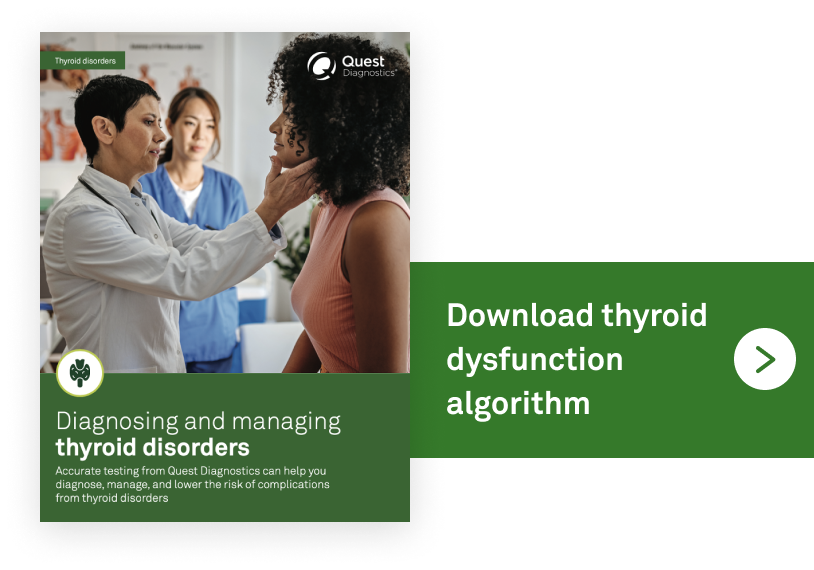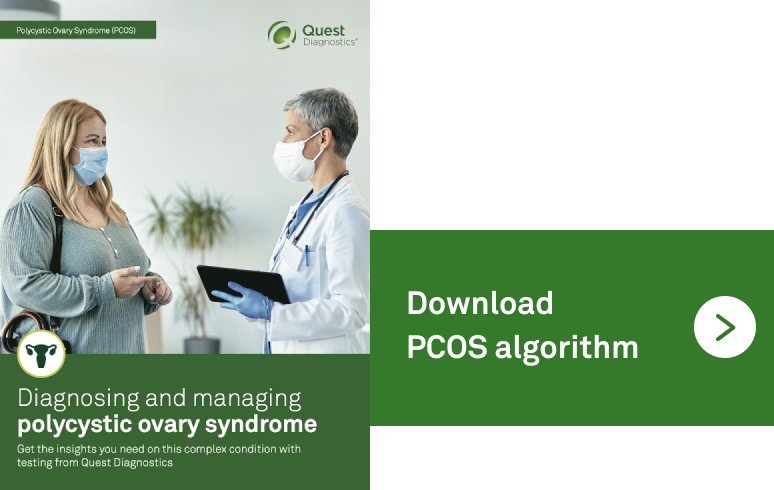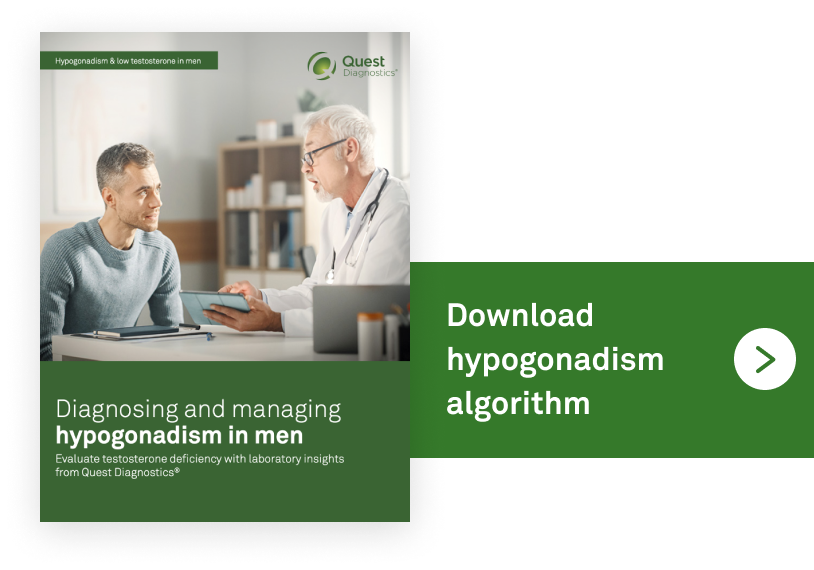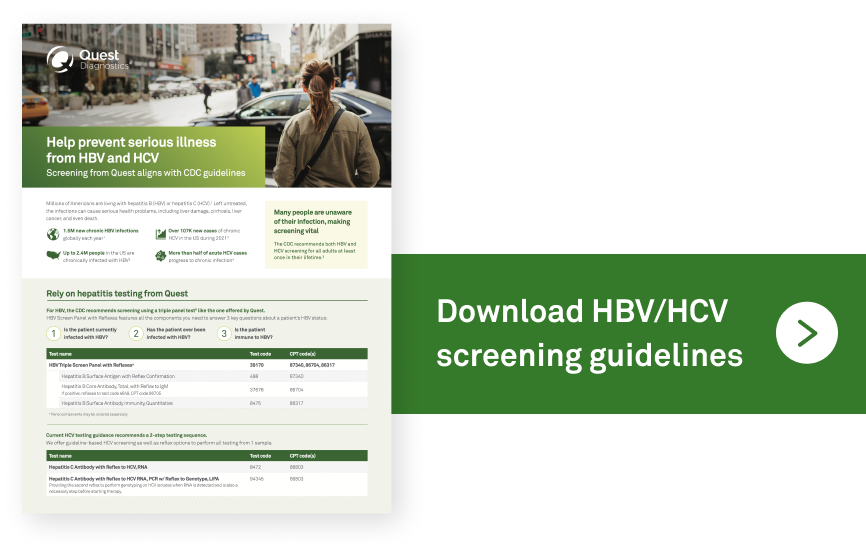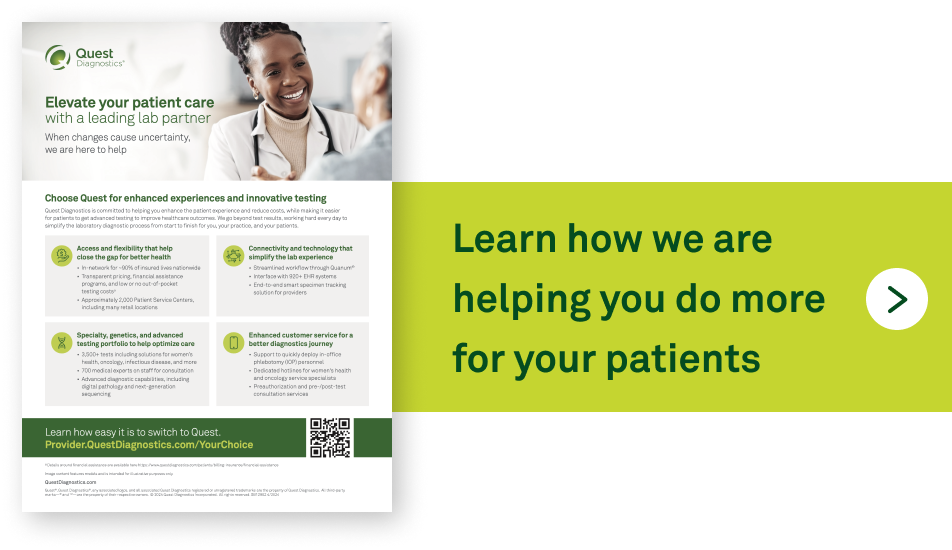May 2024

Discoveries, trends, and discussions in medical diagnostics
|
|
National Women’s Health Month: making women’s health a priority |
|
|
National Women’s Health Month: making women’s health a priority |
|
|
National Women’s Health Month: making women’s health a priority |
National Women’s Health Month: making women’s health a priority |

|
Better outcomes |
Better outcomes |
Improving the diagnosis rate for endocrine conditions in primary care
Insights from the lab: guideline-recommended hepatitis testing
|
|
For HBV, the CDC recommends screening using a triple panel test3 like the one offered by Quest |
|
|
For HCV, the CDC recommends a 2-step testing sequence.4 We offer the full complement of guideline-based HCV testing as well as reflex options to perform all testing from just one sample |

|
Better experiences |
Better experiences |
A growing concern: Novel Psychoactive Substances
|
|
Panel periodically updated based on current surveillance data |
|
|
No test code or EHR updates required |
Blood-based biomarker testing can revolutionize your approach to the Alzheimer’s disease care pathway
Identifying the source of memory challenges at the earliest stages is imperative to support care pathways. Differentiating between normal aging and Alzheimer's disease or other forms of dementia in aging patients is crucial. Blood-based biomarker testing provides an accessible complement to traditional assessments like questionnaires or mental-state exams and can help identify patients who may require further evaluation or interventions.
Plasma testing of beta-amyloid 42/40 (Aβ42/40) ratio and phosphorylated tau181 (p-tau181) biomarkers can help identify the risk of accelerated cognitive decline.7,8 These tests provide actionable insights to aid in identifying patients in the earliest stages of the disease, when interventions are most likely to be effective.7,9



Understanding pet allergies

|
Removing traditional barriers to testing |

|
Removing traditional barriers to testing |
Removing traditional barriers to testing |
Stay informed:
New CMS changes for HbA1c
The following tests are covered:
- Blood glucose testing
- HbA1c testing
The following patients are covered:
- Medicare beneficiaries with certain diabetes risk factors or who have been diagnosed with prediabetes
Screenings are also covered if your patient:
- Is 65 years of age or older
- Is overweight
- Has parents or siblings with a history of diabetes
- Has a history of gestational diabetes or delivered a baby weighing more than 9 lb
Achieving Quadruple Aim:
Quest supports you and your patients
- Romeo GR, Hirsch IB, Lash RW, Gabbay RA. Trends in the endocrinology fellowship recruitment: reasons for concern and possible interventions. J Clin Endocrinol Metab. 2020;105(6): 1701-1706. doi: 10.1210/clinem/dgaa134
- CDC. Global viral hepatitis: millions of people are affected. Updated July 19, 2021. Accessed November 17, 2023. https://www.cdc.gov/hepatitis/global/index.htm
- CDC. Screening and testing recommendations for chronic hepatitis B virus infection (HBV). Updated March 28, 2022. Accessed December 13, 2023. https://www.cdc.gov/hepatitis/hbv/testingchronic.htm
- US Preventive Services Task Force. Screening for hepatitis C virus infection in adolescents and adults: US Preventive Services Task Force recommendation statement. JAMA. 2020;323(10):970-975. doi:10.1001/jama.2020.1123
- Peacock A, Bruno R, Gisev N, et al. New psychoactive substances: challenges for drug surveillance, control, and public health responses. Lancet. 2019;394(10209):1668-1684. doi:10.1016/s0140-6736(19)32231-7
- Mohr ALA, Logan BK, Fogarty MF, et al. Reports of adverse events associated with use of novel psychoactive substances, 2017–2020: a review. J Anal Toxicol. 2022;46(6):e116-e185. doi:10.1093/jat/bkac023
- Janelidze S, Palmqvist S, Leuzy A, et al. Detecting amyloid positivity in early Alzheimer’s disease using combinations of plasma Aβ42/Aβ40 and p-tau. Alzheimers Dement. 2022;18(2):283-293. doi:10.1002/alz.12395
- Meyer PF, Ashton NJ, Karikari TK, et al. Plasma p-tau231, p-tau181, PET biomarkers, and cognitive change in older adults. Ann Neurol. 2022;91(4):548-560. doi:10.1002/ana.26308
- Hampel H, Hu Y, Cummings J, et al. Blood-based biomarkers for Alzheimer’s disease: Current state and future use in a transformed global healthcare landscape. Neuron. 2023;111(18):2781-2799. doi:10.1016/j.neuron.2023.05.017
- Association AVM. U.S. pet ownership statistics. Accessed April 8, 2024. https://www.avma.org/resources-tools/reports-statistics/us-pet-ownership-statistics


